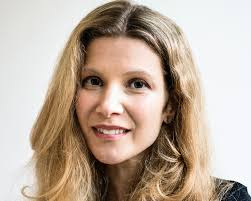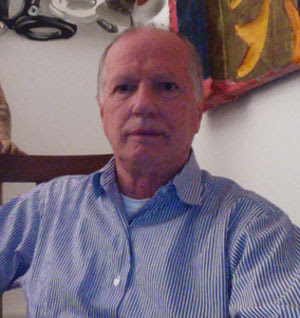Just months before the great writer Philip Roth passed away, a young woman penned a fascinating first novel that featured an elder writer with a surprising and definite resemblance to Roth. Turns out, he was the model for the character and he did have an affair, years ago, with the much younger woman, as depicted in the novel. As if, since Roth stopped publishing five years ago, he had to be present in fiction in another way and it works. In a recent interview, Roth said, "she got me." And what a wonderful me he was, in this novel as in life.
 |
| Agent-turned novelist Lisa Halliday |
In the
first part of three-part novel ASYMMETRY, author Lisa Halliday describes the tale of a junior editor having an
affair with the revered older east coast writer, and takes place in Manhattan and Long Island, Roth's habitats, at the onset of the first Iraq war. The anxiety of the twin towers hovers over the city.
It was cool for June; a steam rose from the
water as though a river of magma flowed only a fathom below. Rustling trees
cast trembling shadows on the basin, whose layers had chipped away over the
years to leave swirls of old grays, greens, and aquamarines, like an antique
sea chart. Beneath the surface, Alice’s hands, still coming together and
swiveling apart, began to look less like instruments of propulsion than like
confused magnets, or hands trying to find their way out of a dark room. But
still, she swam.
The unlikely
affair between the older Jewish westside writer, and the young quirky Irish east sider is surprisingly and delightfully funny in parts, as I'm told Roth was. Despite the sensuality, and the May-December romance, there is something decidedly sweet between them, as if a last glimpse of innocence in a world gone crazy.
 |
| The great Philip Roth |
Our mother’s tendency to mythologize our
childhoods would have you believe that Sami, who had never touched a musical
instrument before, sat down at that piano for the first time and was rolling
out bagatelles by sundown. I don’t think it was quite like this. A more
accurate version surely begins with a fact that has long confounded my parents,
and me to a degree as well, and that is that my brother did not like living in
America. Almost from the beginning he complained of missing his Baghdadi
friends and pointedly lagged behind in school, although he was no less clever
than his classmates and had spoken English as well as Arabic since he was
three.
The filling
in this novelistic sandwich is an entirely new set of characters - hyphenated
Americans and Brits and Muslims – in the nearly McCarthy-esque days during the
gulf war as Saddam Hussein is overthrown. The voice is completely different,
the story line geo-political, and only a subtle hint in Part one [which I
nearly missed] suggests the young woman’s interest in this culture and in writing her own novel.
The most
profound asymmetry is in the relationships, between cultures, religions and
educational status and, in some ways, also reflects the assimilation of the
Jewish writer into the mainstream, in contrast to the perpetual turmoil in the
middle east.
Or not.
This novel is as much about interpretation and the perception we bring to the
reading. The middle part may be jarring, and seems so far from the story line
it’s hard to make sense of it, at first, but take your time with it. I prefer
only to review books I recommend, and this one gave me pause, but if you’re
interested in post-modern literature with superlative characterization and
excellent writing, despite its asymmetrical nature, or perhaps because of it, there is much to commend the writing and the pleasure of being in Roth's presence, as close as we can get now other than reading his own words, which I intend to continue to do often.


